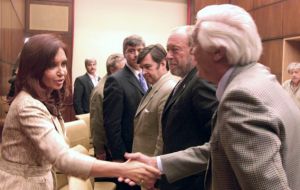MercoPress. South Atlantic News Agency
Argentine farmers and government dialogue announced for Friday
 Pte. Fernandez in her last meeting with Farmers Association
Pte. Fernandez in her last meeting with Farmers Association Argentine president Cristina Fernandez de Kirchner next Friday will meet with representatives from the country's four organizations that staged a three week lock out to protest the increase in sliding export taxes on oil seeds and cereals, according to sources in Buenos Aires.
The four organizations, the country's strongest, which had requested the meeting, are Sociedad Rural Argentina (SRA), Confederaciones Rurales Argentinas (CRA), Federación Agraria Argentina (FAA) and Coninagro. Oscar Parrilli the Argentine Executive Secretary General made the contacts and extended the invitations. "I think this first interview is a good signal. We're going to begin talking to see how we can work out a proposal that addressed farmers' demands and requests", said Luicano Miguens, president of SRA, probably the most influential of the four organizations. Eduardo Buzzi, FAA president described the invitation as "a political gesture" but cautioned that the aspiration of the camp is "to concert long term farm policies". Buzzi added that obviously "the heart of the matter and which triggered the conflict (export duties) will be discussed, but also small farmers plights have to be considered, which means we will have full days of work ahead" CRA president Mario Llambías said "the government's proposals (for small farmers) are not enough and we need other alternatives, which is the purpose of the meeting". He praised the invitation but added small and medium farmers "are having a rough time and we are concerned about distribution of resources in the country". Last Saturday Mrs. Kirchner flew to France to meet President Nicolas Sarkozy and farm leaders were restless about the promised meetings with government officials. Farmers suspended the conflict for up to 30 days on April 2 in order to negotiate with the government. Earlier in the day several farm leaders had warned that the conflict could resume if there was no reply from the government. "The truce could end up being called off before then if there's no kind of response or the chance of progress," Pedro Apaolaza, president of the Carbap association, told a local radio. Mr. Miguens said it would be disappointing that during the truce which ends May 2, "no firm solutions could be worked out". He added that "farmers don't believe anymore in promises, they want solutions to their problems; letting the momentum go by would be harmful for the camp and for the country". The farmers' protest landed the incoming president with her biggest political challenge since she succeeded her husband, Néstor Kirchner, to the presidency in December. Farmers manned road blocks to stop farm goods reaching market, making beef scarce in a country where steak is an everyday staple. There were also shortages of dairy goods and vegetables, and grains exporters had to renege on contracts. In an effort to ease the tension, the government announced measures such as tax rebates for small farmers, low-cost loans for machinery and subsidies on transport costs for those based far from ports. But some farmers are impatient for negotiations to start. Industry sources said that if the strike was revived in May, it would probably be directed specifically at the multimillion-dollar grains trade. Argentina is one of the world's top suppliers of soy, wheat and corn. Separately, Cabinet Chief Fernández said that he has "no problem" with Chubut Governor Mario das Neves (a staunch supporter of Mrs. Kirchner) who over the last few days criticized him over his handling of the farmers' lockout. "It takes two to have an argument and I have nothing to discuss," the Cabinet Chief said. Das Neves was the first pro-government governor to publicly vent disagreement with the national administration over the handling of the protests launched against an increase in export taxes.




Top Comments
Disclaimer & comment rulesCommenting for this story is now closed.
If you have a Facebook account, become a fan and comment on our Facebook Page!